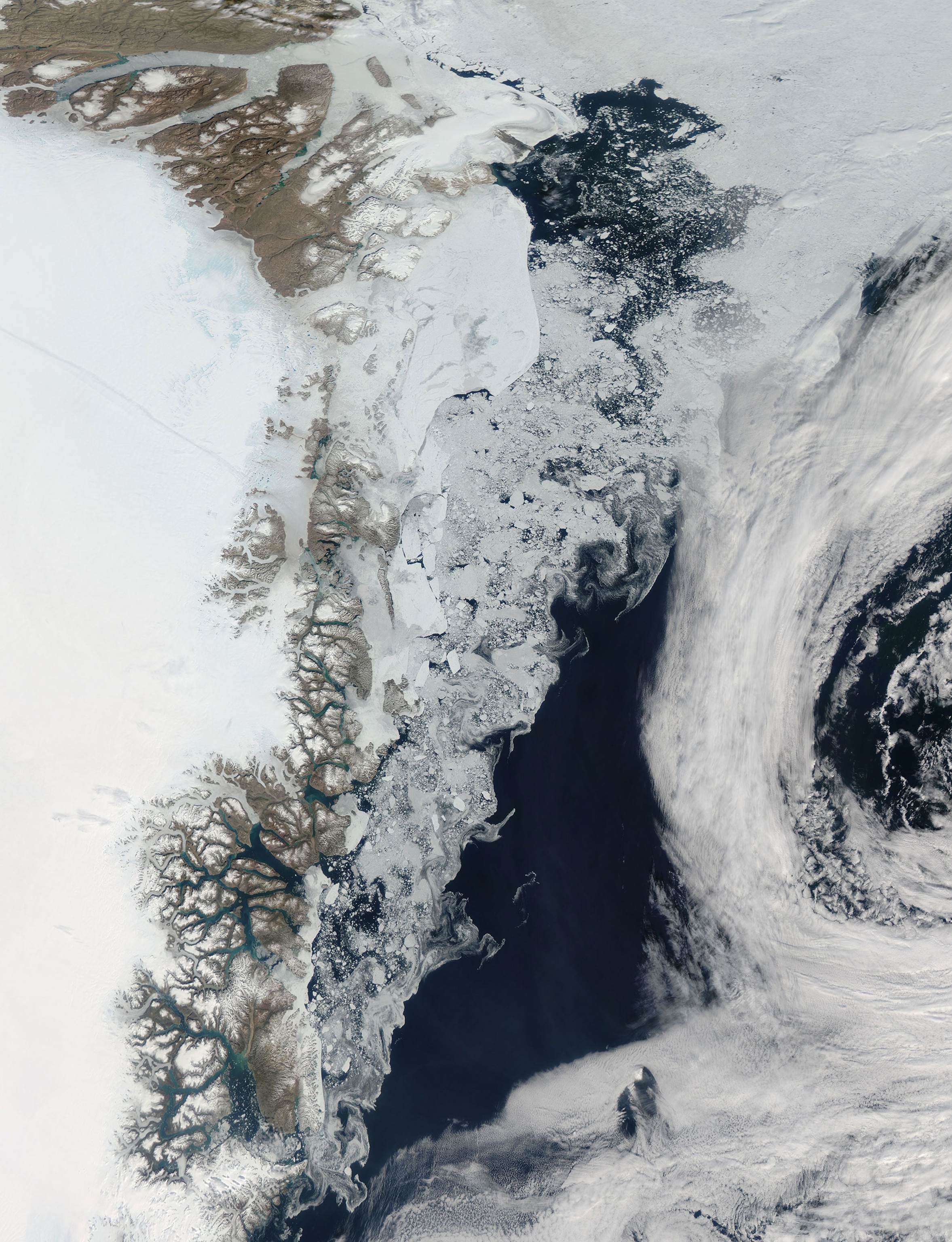
Record Greenland Melting Caused by Surprising Feedback Loop
As Arctic sea ice extent hits a record May low, a new study shows how melting changes Greenland's weather, with far-reaching consequences.
Two days after Arctic sea ice hit a new record low extent for May, a new study hints at how this accelerating trend could make melting in Greenland even worse, with serious consequences for global climate and sea level rise.
Satellite observations published by the U.S. National Snow and Ice Data Center on Tuesday reveal that Arctic sea ice covered an area of just 4.63 million square miles (12 million square kilometers). That’s about 5 percent lower than the previous record low, set in May 2004, and more than 10 percent lower than the average sea ice extent from 1981 to 2010.
“It’s pretty worrisome,” says climate scientist Jennifer Francis of Rutgers University. “We’re in uncharted territory, in terms of the human experience.”
May 2016, the fourth month this year to set a monthly record low, also saw ice melting far faster than historical averages. This past month, the Arctic lost some 23,600 square miles (61,000 square kilometers) of ice per day, about 30 percent faster than the long-term average of 18,000 square miles (46,600 square kilometers) per day.
The melting of Arctic sea ice poses dangerous long-term threats to climate because sea ice plays a huge role in reflecting solar radiation away from Earth. As climate change warms the oceans and melts the sea ice, the Arctic becomes darker on average, increasing its ability to absorb more heat and causing further warming of the oceans—a runaway feedback loop called Arctic amplification.
And as the new study—published on Thursday in Nature Communications—shows, Arctic amplification may play a role in Greenland’s melting ice, as well, potentially contributing to future sea level rise.
The study, authored by a team led by Marco Tedesco of Columbia University’s Earth Institute, analyzed weather data to show that Greenland’s record melting in the summer of 2015 was caused by unusual wobbles in the jet stream, the undulating, riverlike current of air that circles the Northern Hemisphere.
It’s thought that by lessening the temperature difference between polar latitudes and more temperate regions, climate change can slow down the jet stream, and this slowdown could give the jet stream enough wiggle room to let it bend far more northward than it usually does. In fact, the study reveals the northernmost record of the jet stream ever observed.
The jet stream’s wacky northern upswing formed a blocking event—a stable, clockwise-circulating weather pattern—that hovered over Greenland, drawing in warm, moist air from lower latitudes, which led to last summer’s warm temperatures and shockingly high melting.
In and of itself, the study doesn’t link back to Arctic amplification directly, but a recent flurry of climate science papers connects the rest of the dots. A study published on May 2, for instance, shows that blocking events have become significantly more common over Greenland since the 1850s because of climate change. Another—also published in May—definitively connects these weather patterns back to Arctic sea ice loss, via Arctic amplification.
“[Medesco’s] paper adds a piece to the puzzle,” says Francis, who co-authored the paper connecting blocking events to sea ice loss. “It’s a complicated puzzle—but it’s really starting to come together.”
And if Greenland’s ice continues to melt, not only would it contribute to sea level rise, but also to changes in global ocean currents: As cool meltwater accumulates directly south of Greenland, it dilutes the cold, salty seawater of the north Atlantic, making it sink less rapidly—slowing down the Atlantic meridional overturning circulation (AMOC), a global circulation system that’s key to transferring heat through the world’s oceans.
In fact, a March 2015 study in Nature Climate Change illustrated that climate change already slowed down the AMOC throughout the 20th century—setting the stage for future climatic woes, if exceptional sea ice melting like May’s continues in the future.
Follow Michael Greshko on Twitter.
Correction:
A sentence in an earlier version of this story incorrectly referred to the Northern Hemisphere's jet stream as the Gulf Stream. Jet streams are narrow, river-like air currents in the upper levels of the atmosphere. The Gulf Stream is a powerful current in the Atlantic Ocean.